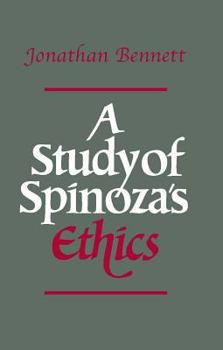A Study of Spinoza's Ethics
Select Format
Select Condition 
Book Overview
"With an astonishing erudition . . . and in a direct no-nonsense style, Bennett expounds, compares, and criticizes Spinoza's theses. . . . No one can fail to profit from it. Bennett has succeeded in... This description may be from another edition of this product.
Format:Paperback
Language:English
ISBN:0915145839
ISBN13:9780915145836
Release Date:April 1984
Publisher:Hackett Publishing Company
Length:408 Pages
Weight:1.23 lbs.
Dimensions:0.9" x 6.0" x 9.0"
Customer Reviews
3 ratings
A Commentary for Serious Students
Published by Thriftbooks.com User , 17 years ago
This is an excellent commentary on Spinoza's Ethics. It is intellectually demanding and probably too difficult for most undergraduates. It should be required reading for any graduate seminar on the topic. Bennett is highly critical but at the same time very fair in his analysis. Spinoza's Ethics is a rigorous and demanding work, and the same could be said for Bennett's commentary. With this book Spinoza has found a critic he so richly deserves. Bennett could be a poster boy for 20th century Anglo-American analytical philosophy. I highly recommend his other works, especially those on Kant and his magnum opus, Learning From Six Philosophers. The latter work engages the Big Six of Early Modern Philosophy, Descartes, Spinoza, Leibniz (the Rationalists) and Locke, Berkeley, and Hume (the Empiricists). At the top of this review it says that this book is out of print. This is not true. It is available in a paperback edition. I am currently reading the Spinoza chapters of Learning From Six Philosophers. Bennett's analysis may be summed up in one word: superb!
Persistence required
Published by Thriftbooks.com User , 18 years ago
I grew up in science and have only recently found philosophy. So once past Philosophy for Dummies I can find myself in serious trouble. Bennett is not easy, perhaps harder to read than Spinoza. But he allows me to catch my breath with his generous examples, and I learn process while working on content. A degree in philosophy is not a prerequisite to read this book, but persistence is. Spinoza closes Ethics with: "If the way that I have shown to lead to this seems to be very arduous, yet it can be discovered. And indeed it must be arduous, since it is found so rarely. For how could it happen that, if salvation were ready at hand and could be found without great labour, it is neglected by almost all? But all excellent things are as difficult as they are rare." Bennett's book echoes this sentiment.
A close critical reading of Spinoza's _Ethics_
Published by Thriftbooks.com User , 23 years ago
I see that Jonathan Bennett is about to publish a new book entitled _Learning from Six Philosophers_. So this looks like a good time to review this earlier book.As the title of Bennett's forthcoming book suggests, his primary interest in a philosopher is not whether he was right in every particular but whether he can be read profitably -- i.e., whether it is worthwhile to engage the philosopher's thought as a means to thinking things through oneself. And happily, Bennett's close and critical reading of Baruch Spinoza's _Ethics_ is carried out in this spirit."Happily" because Bennett clearly has major disagreements with Spinoza, and disagreements do not always foster intellectual sympathy. But Bennett insinuates his way very carefully and deliberately into Spinoza's thought, with the skill of a sharp analytical thinker and the ease of one long familiar with his text. This is the sort of disagreement that makes for good philosophy; every philosopher should have a critic of Bennett's caliber.His exposition of the main lines of Spinoza's thought is clear and (in my opinion) correct. For example, in setting out the essentials of Spinoza's outlook, he makes a nice short argument that Spinoza was not (as is sometimes claimed) an atheist. (This is, by the way, in the context of a fine summary of Spinoza's "rationalism.") I shall not multiply examples in a brief review; suffice it to say that Bennett takes great pains to let Spinoza speak for himself, and even to make arguments for Spinoza that Spinoza did not think to make on his own, before launching into searching criticism and disagreement. (He often begins his replies with remarks like, "This is the very best I can do for Spinoza, but unfortunately it is not good enough.")And Bennett's disagreements are well-founded even where I disagree with them in turn. For example, he closes the volume with what is undoubtedly a controversial claim: that, based on his close reading, the second half of Chapter Five of the _Ethics_ really has nothing of value to offer the modern reader.Bennett does not especially like this conclusion and almost wishes that he could have omitted it from the book. Yet he finds himself driven to it by the difficulty -- which even Spinoza's defenders must surely acknowledge -- of finding anything in the passage that admits of any clear interpretation at all. Bennett concludes, with a great deal of justice, that if even Spinoza's keenest expositors descend into feckless handwaving and purple sermonizing when they come to this passage, the view that there is some crucially important meaning in it can hardly be maintained.Here again, this is just the sort of close, critical analysis to which anyone claiming the title of philosopher should expect to be subjected. (Time and again in reading this work, I am reminded of the tone and manner of C.D. Broad's _Examination of McTaggart's Philosophy_.)And again, it is clear that Bennett _does_ regard Spinoza's _Ethics_ as profitable reading. This i





